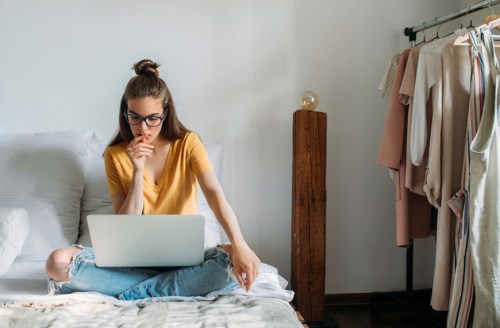Let’s just say it: social distancing sucks. It’s absolutely necessary to flatten the curve and keep people safe from the spread of the novel coronavirus—but is it fun? Not really. We’re spending more time holed up at home, away from our families and friends, at the mercy of Zoom and FaceTime for the littlest bits of human connection. It’s hard not to get down about all-things-COVID-19—it’s even harder to do it without a physical social support system. But it’s certainly not impossible. Just ask Jon Bailey, a former Navy submariner and scuba instructor, who recently took to Twitter to share his tips for living in small spaces.
Bailey, who “endured many weeks and months cooped up in a steel tube under the waves,” knows a thing or two about social isolation over long periods of time. His advice, which was met with overwhelmingly positive feedback, offers easy, practical tips for coping with confined living arrangements while fighting off loneliness, anxiety, and lethargy.
During my time in the Submarine Service, I – along with many others – endured many weeks and months cooped up in a steel tube under the waves. I just thought I’d share a few coping strategies for many of you now facing a Covid-19 “patrol”. pic.twitter.com/m9ObHd6FU9
Baily’s first tip is to build a schedule and keep at it. “Life at sea is dictated by shifts and routines,” he says. “Make a routine now, test it then write it down and stick to it.” Especially as many of us adopt a remote work schedule, creating a routine with distinct goals and clear breaks is vital to staying productive. Feeling blah? Write down your to-do list—it’ll help jog your motivation levels and get things moving.
Bailey also suggests prioritizing healthy habits, like eating regularly, cleaning your space and moving your body. “Twenty to 30 minutes a day of whatever as a minimum,” he says. Whether it’s taking a walk around the block (yes, you’re allowed to go outside, just keep your distance!), a quick yoga flow or an online HIIT class, exercise is key. “It’s a natural antidepressant, breaks up the day and keeps you healthy.”
What other coping strategies got Bailey through his shifts at sea? Maintaining a balance between privacy and connection. Yes, even when social distancing, you still need your alone time—especially if you’re sharing tight quarters with roommates or partners. Lia Avellino, director of head and heart at The Well, says “a boundary is a bid for closeness. It’s not a distancing effect, it’s a meeting place.” So timeshare that living room, read a book, or just shut your door for a little bit—it’ll do your relationship good in the long run.
CONNECT: even during radio silence we still got a weekly telegram from loved ones back home. This was a weekly highlight. Keep in touch with your people. My current work have agreed a daily “coffee” catch up online even if there’s no work to discuss.
It’s normal to feel extra nervous about the coronavirus—it’s scientifically proven uncertainty only adds to anxiety. Bailey’s last piece of advice is all about perspective. “Like all other patrols, this one will end,” he says. “Bring your world closer, focus on little things you enjoy and make plans for the future.”
Your apartment is no submarine, but sharing space of any kind is tough. Here’s how to deal with cabin fever when social distancing with other people. And if you’re still struggling with feeling disconnected, compassion meditation might help.
Sign Up for Our Daily Newsletter
Get all the latest in wellness, trends, food, fitness, beauty, and more delivered right to your inbox.
Got it, you've been added to our email list.











